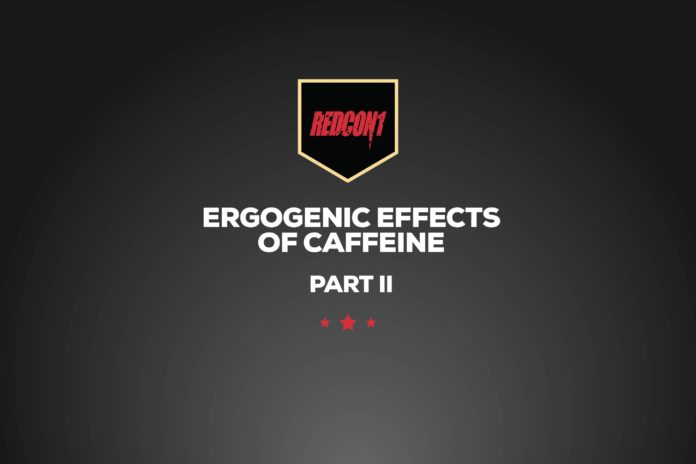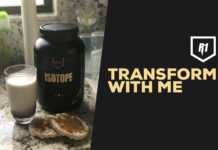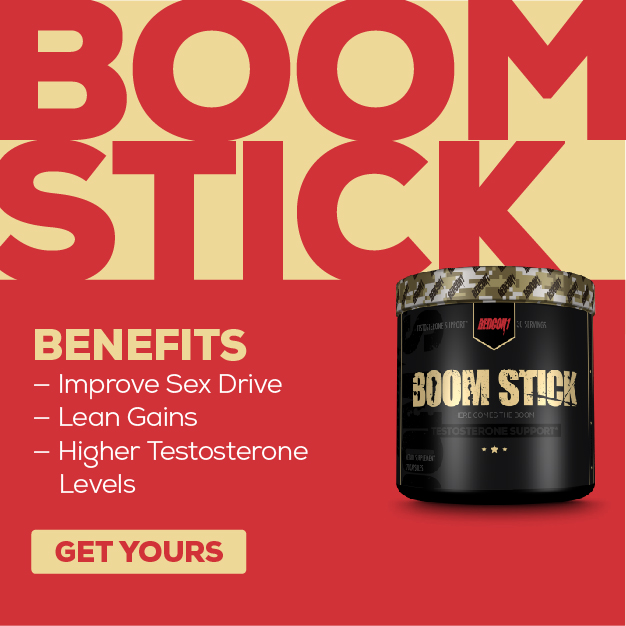
RedCon1 – Ergogenic Effects of Caffeine Part II
The second ergogenic benefit we will be looking at is how caffeine effects us during periods of high intensity, shorter duration exercises as this is what you’ll typically be utilizing while resistance training for physique sports. The first bit of literature comes from Schneiker et al. This study was conducted to examine the effects of acute caffeine ingestion on prolonged intermittent-sprint performance. Using a double-blind, placebo-controlled design, 10 male team-sport athletes completed two exercise trials, separated by 7 d, 60 min after ingestion of either 6 mg x kg(-1) caffeine or placebo. The exercise trial was performed on a front-access cycle ergometer and consisted of 2 x 36-min halves, each composed of 18 x 4-s sprints with 2-min active recovery at 35% VO2peak between each sprint. Urinary caffeine levels were measured after exercise. The total amount of sprint work performed during the caffeine trial was 8.5% greater than that performed during the placebo trial in the first half and was 7.6% greater in the second half. Similarly, the mean peak power score achieved during sprints in the caffeine trial was 7.0% greater than that achieved during the placebo trial in the first half and was 6.6% greater in the second half. This study revealed that acute caffeine ingestion can significantly enhance performance of prolonged, intermittent-sprint ability in competitive, male, team-sport athletes (8.)
The next ergogenic benefit is its ability to reduce DOMs or Delayed Onset Muscle Soreness. Although the research is sparse, its anecdotally reports must be recognized. Hurley et al looked at this very topic. The primary purpose of this study was to examine the effect of caffeine ingestion on muscle soreness, blood enzyme activity, and performance after a bout of elbow flexion/extension exercise. Nine low-caffeine-consuming males were randomly assigned to ingest either caffeine or placebo 1 hour before completing 4 sets of 10 bicep curls on a preacher bench, followed by a fifth set in which subjects completed as many repetitions as possible. Soreness and soreness on palpation intensity were measured using three 0-10 visual analog scales before exercise, and 24, 48, 72, 96, and 120 hours after exercise. After a washout period, subjects crossed over to the other treatment group. Caffeine ingestion resulted in significantly lower levels of soreness on day 2 and day 3 compared with placebo. Total repetitions in the final set of exercise increased with caffeine ingestion compared with placebo. This study demonstrates that caffeine ingestion immediately before an upper-body resistance training out enhances performance. A further beneficial effect of sustained caffeine ingestion in the days after the exercise bout is an attenuation of DOMS. This decreased perception of soreness in the days after a strenuous resistance training workout may allow individuals to increase the number of training sessions in a given time period (9.)
Although the list of beneficial ergogenic effects of caffeine continue on dramatically including things such as increased reaction time, possibly lowered perception of exertion, potential increase in testosterone levels, an ability to increase training volume, etc (10, 11), I think it is pertinent to conclude this article on the two main forms of caffeine you will most likely see in your pre workout supplements. Those two are: standard caffeine and caffeine anhydrous. The difference is actually quite simple, yet makes a massive amount of difference and it only has to do with the amount of water associated with the caffeine molecule itself. Caffeine anhydrous has essentially no water (I believe possibly only 0.5%) making it much more potent and easier to absorb. There is a very good study from Eric Trexler that looked at the effects of coffee and caffeine anhydrous on strength and sprint performance that may be able to give you a better understanding of caffeine anhydrous itself (12.) In conclusion, caffeine in any form is going to give you a performance enhancing effect. The anhydrous form is the superior version but you will still see benefits to standard caffeine/coffee ingestion.
References
1. Caffeine in coffee: its removal. Why and how? K. Ramalakshmi, B. Raghavan. Crit Rev Food Sci Nutr. 1999 (https://www.ncbi.nlm.nih.gov/pubmed/10516914)
2. Adenosine A1-A2A receptor heteromers: new targets for caffeine in the brain. Sergi Ferre, Francisco Ciruela, Janusz Borycz, Marcello Solinas, Davide Quarta, Katerina Antoniou, Cesar Quiroz, Zuzana Justinova, Carme Lluis, Rafael Franco, et al. Front Biosci. 2008 (https://www.ncbi.nlm.nih.gov/pubmed/17981720)
3. Caffeine and exercise. Scott A. Paluska. Curr Sports Med Rep. 2003 (https://www.ncbi.nlm.nih.gov/pubmed/12834577)
4. Computational study of the binding modes of caffeine to the adenosine A2A receptor. Yuli Liu, Steven K. Burger, Paul W. Ayers, Esteban Vöhringer-Martinez. J Phys Chem B. 2011 (https://www.ncbi.nlm.nih.gov/pubmed/21970461)
5. The role of adenosine in the regulation of sleep. Zhi-Li Huang, Yoshihiro Urade, Osamu Hayaishi. Curr Top Med Chem. 2011 (https://www.ncbi.nlm.nih.gov/pubmed/21401496)
6. Caffeine supplementation and multiple sprint running performance. Mark Glaister, Glyn Howatson, Corinne S. Abraham, Richard A. Lockey, Jon E. Goodwin, Paul Foley, Gillian McInnes. Med Sci Sports Exerc. 2008 (https://www.ncbi.nlm.nih.gov/pubmed/18799995)
7. Caffeine Ingestion Reverses the Circadian Rhythm Effects on Neuromuscular Performance in Highly Resistance-Trained Men. Ricardo Mora-Rodríguez, Jesús García Pallarés, Álvaro López-Samanes, Juan Fernando Ortega, Valentín E. Fernández-Elías. PLoS One. 2012 (https://www.ncbi.nlm.nih.gov/pubmed/22496767)
8. Effects of caffeine on prolonged intermittent-sprint ability in team-sport athletes. Knut Thomas Schneiker, David Bishop, Brian Dawson, Laurence Peter Hackett. Med Sci Sports Exerc. 2006 (https://www.ncbi.nlm.nih.gov/pubmed/16540848)
9. The effect of caffeine ingestion on delayed onset muscle soreness. Caitlin F. Hurley, Disa L. Hatfield, Deborah A. Riebe. J Strength Cond Res. 2013 (https://www.ncbi.nlm.nih.gov/pubmed/24164961)
10. Dose effect of caffeine on testosterone and cortisol responses to resistance exercise. C. Martin Beaven, Will G. Hopkins, Kier T. Hansen, Mathew R. Wood, John B. Cronin, Timothy E. Lowe. Int J Sport Nutr Exerc Metab. 2008 (https://www.ncbi.nlm.nih.gov/pubmed/18458357)
11. Effect of caffeine on reactive agility time when fresh and fatigued. Daniel M. Duvnjak-Zaknich, Brian T. Dawson, Karen E. Wallman, Greg Henry. Med Sci Sports Exerc. 2011 (https://www.ncbi.nlm.nih.gov/pubmed/21266929)
12. Effects of coffee and caffeine anhydrous on strength and sprint performance. Trexler, E. T., Roelofs, E. J., Hirsch, K. R., Mock, M. G., & Smith-Ryan, A. E. (2015). Journal of the International Society of Sports Nutrition (https://www.ncbi.nlm.nih.gov/pmc/articles/PMC4595305/)
ergogenic effects
ergogenic effects
ergogenic effects


















